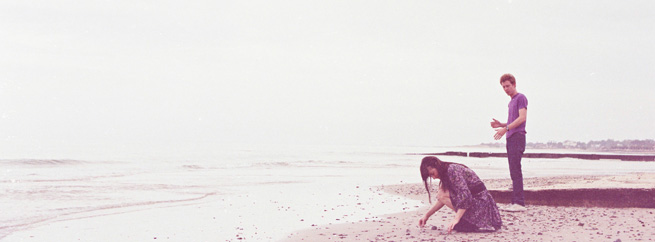
Beyond the Road / Por el Camino
01 September, 2011The road movie can act as a sort of substitute for old fashioned travel writing. The atmosphere of the location’s main attractions can be woven into a narrative framework to give the kind of living, breathing brochure which a travel agent would kill for.
Charly Braun has certainly managed such a feat with his debut feature film, Beyond the Road. This particular Uruguayan tourist brochrue is a seamless blend of vast landscapes and interviews with their inhabitants which forms the perfect rural framework for two, otherwise lonely, strangers to gradually fall for each other.
The Argentinean Santiago has come to Uruguay to find some land which he has inherited from his deceased parents. He has spent the last few years as an investment banker in New York but is now not looking for a job; he’s looking for something else, something which he isn’t sure of yet.
This, he candidly tell Juliette soon after meeting her. He had noticed the Belgian traveller dragging a suitcase along and offered her a lift. She can’t help but laugh, when she hears about Santiago’s failed business and empty life, not out of insensitivity, just in shock at how quickly he bares all.
Very quickly a relationship is established as the act of travelling brings them closer. Santiago stops a dog from drowning, they chat with a local farmer, visit an empty disco which Santiago used to frequent and they sit and stare at the sea.
The romantic tension is visible from the outset. Both to the audience and to the people they encounter. After Juliette informs one man that they are not an item, he asks her:
“How long it will take?”(sic)
Spoken in a slightly fumbled English which is typical of the film. The cynics may want to claim that Braun is aspiring to a wider audience than may be found in the Latin speaking world alone (the Radiohead and Sigur Rós on the soundtrack may also suggest this), but most of it comes out as very sweet and endearing, especially when Juliette makes silly little jokes. Looking backwards and forwards between the Seth Green lookalike Santiago, and a picture of his parents she asks: “Why are you red?”
Despite much extended eye contact and shared experiences, at points it looks as though their relationship is doomed to a mere platonic companionship, especially since Juliette’s original motivation to come to Uruguay was to meet up with a guy called Juan.
During an art exhibition put on by Santiago’s connoisseur godfather, Juliette appears just at a moment when Santiago is talking to a gorgeous girl from his past. She is introduced but then ignored and appears to feel like a frumpy, unwanted hanger on. She is by no means frumpy however, and has a classic Gallic cuteness which the other guests can’t help but recognise, comparing her to Carla Bruni.
Occasionally Juliette’s humour grates on Santiago (including a scene where he is offended by a comparison with some orange candy-floss) and his temper is shortened, he becomes more distant as he moves in the circles of his old world, schmoozing with art collecting Uruguayan landowners and watching distressed horses jump about at rodeos. The difference between the protagonists reaches a critical point and Juliette leaves to pursue her original aim of finding Juan and joining the hippy commune, with Santiago chasing not far behind.
One thing which really makes the film stand out is the mini interviews and interactions with some of the locals. A peasant helps out with some petrol and refuses to take any money in return; an ageing gaucho spills his heart about trying to pass on techniques to younger generations; a man recounts his search for his roots in the countryside.
If the little conversations with various characters along the way are not actually based on real people, then they have been very well written, and shot with a natural style which makes them look as authentic as possible. It’s the Naomi Campbell cameo in particular which makes me suspect that at least some of the conversations with locals are genuine. She is no stranger to the continent, having done a series of roving reports for GQ magazine, including an interview with Hugo Chavez. Here she speaks about escaping the glare of the media in the isolated countryside and makes an almost libellous comment, naming a designer whose clothes she won’t wear because of his lack of black models.
The whole plot is a pretty standard ‘will-they-won’t-they?-of-course-they-will’ format, but the inevitability of them getting together in the end does not detract from the film. The joy comes from watching two people quietly become closer and closer. Going through the different stages of being travelling companions, friends, a platonic relationship and finally, inseparable soul mates. The point is in the journey, rather than the destination: a maxim for the road movie if there ever was one.
Beyond The Road is showing as part of the 3rd Brazilian Film Festival of London. Find out more about the festival here.
Follow Sounds and Colours: Facebook / Twitter / Instagram / Mixcloud / Soundcloud / Bandcamp
Subscribe to the Sounds and Colours Newsletter for regular updates, news and competitions bringing the best of Latin American culture direct to your Inbox.

